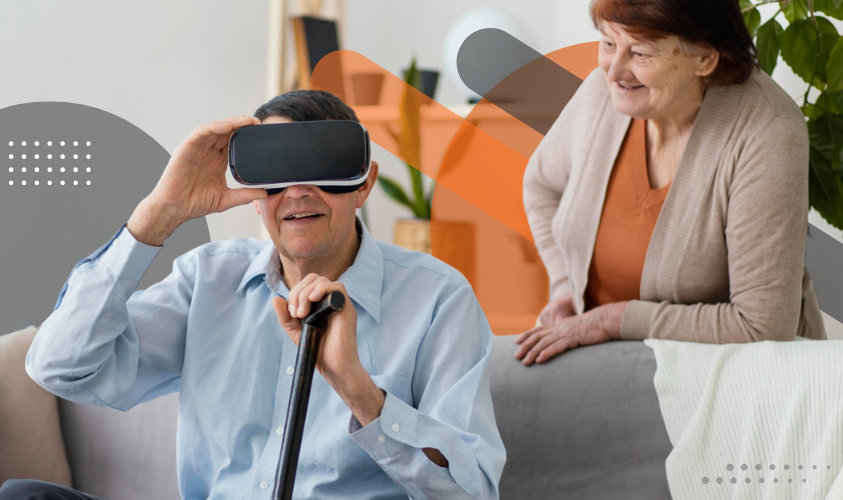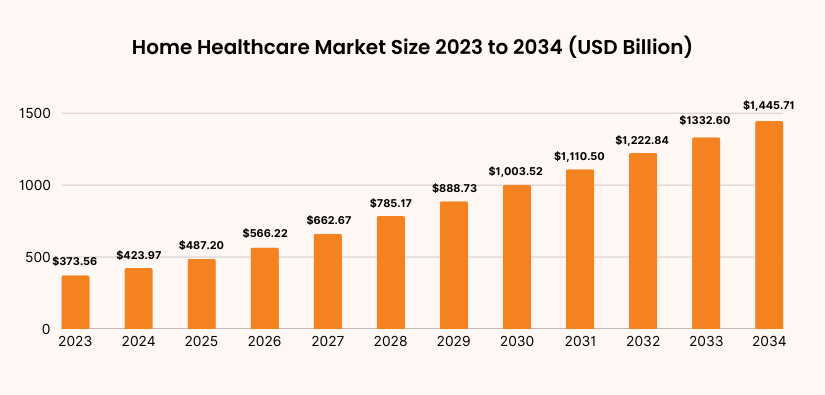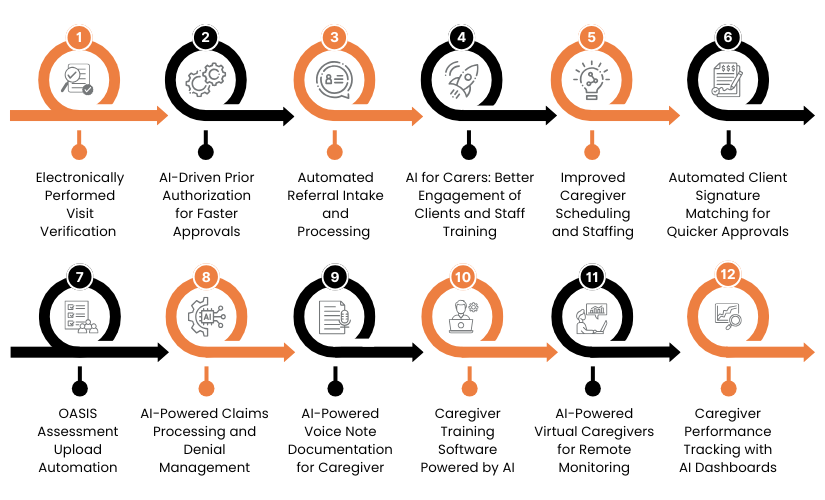
The increasing demand and scarcity of available caregivers are shifting the dynamics, so agencies have little choice but to explore new solutions in the industry. AI-driven home care is revolutionizing business, offering efficient automation and upgraded care quality within the home health setting. As for Generative AI, beginning with predictive analytics and AI-infused chatbots, home-care agencies are fundamentally transforming the art of caregiving and how its workforce is delivered.
The impact of AI is already visible.
A report by Precedence Research says the global AI market in healthcare was $15.1 billion in 2022 and is projected to reach $187.95 billion by 2030, with a CAGR of 37%.

The industry’s growth comes from AI optimizing processes, enhancing decision-making, and personalizing patient care. In-home care, adopting AI helps agencies cut costs, become more efficient, and alleviate caregiver burnout.
But what does this mean for home care providers, caregivers, and patients? How can AI for caregivers enhance training, streamline operations, and deliver better patient outcomes? This article will explore how AI revolutionizes home care, from documentation automation to personalized training.
While the home care sector faces many challenges, making AI adoption necessary, let’s examine these challenges more closely and understand why AI-powered solutions are critical for the future of caregiving.
The alarm is ringing loudly with the call for caregivers. The BLS (Bureau of Labor Statistics) shows that demand for home health and personal care aides will increase by 22% between 2022 and 2032. And they rank as some of the fastest-growing careers. However, there is still a shortage of caregivers.
Some Important Statistics
AI-based training software for caregivers and automation-based solutions can help agencies overcome workforce problems by creating efficiency, avoiding burnout, and providing proper support to caregivers.
Many home care agencies’ resources are used for administrative work.
According to a McKinsey & Company report, healthcare providers spend almost 50% of their time on paperwork instead of patient care. Manually recording visit notes, compliance reports, and care plans creates undue stress on caregivers and administrative staff.
How AI Lowers Administrative Work:
According to Deloitte, agencies can dramatically decrease administrative expenses by up to 30% by incorporating AI in-home care operations.
The NAHC reports that 10,000 people in the U.S. turn 65 every day.
As the number of seniors increases, more would prefer to age at home rather than transfer to assisted living facilities. Care is becoming very personalized and high-quality.
Personalized client care can be made better by AI in the following ways:
With AI assistance, care can be tailored to each client’s unique requirements, ensuring better home care delivery and high client satisfaction.
AI in-home care is revolutionizing the sector by making it more operationally effective, enhancing patient outcomes, and lessening administrative burdens.
The introduction of AI-enabled tools and generative AI in operations enables home care agencies to automate mundane duties, streamline processes, and maximize resource utilization. With AI-enabled chatbots, caregiver training software, and predictive analytics, home care agencies can enhance caregiver engagement, training efficiency, and quality of care while remaining compliant with regulations.

The most challenging task in in-home care is guaranteeing accurate and reliable electronic visit verification. Most caregivers forget to log their activities, resulting in billing errors and compliance issues. AI-enabled chatbots and automated call systems can interact with caregivers and patients via SMS, voice recordings, and mobile applications, ensuring that visits are monitored in real-time. These systems minimize manual follow-ups, thus enhancing cash flow and reducing billing discrepancies.
Prior authorization is one of the time-consuming processes that typically slows home care services. AI bots can seamlessly integrate with payer systems to automate prior authorization submissions, thus minimizing approval time and reducing administrative inefficiencies. AI-enabled chatbots inform caregivers and agencies of pending approvals so services can commence immediately without unnecessary delay.
Home care agencies receive referrals from hospitals, physicians, insurance companies, and community organizations. Manual processing of such referrals is time-consuming and vulnerable to errors. AI in-home care automates the referral intake process by:
By automating these processes, referrals can be processed quicker, paperwork can be minimized, and the number of clients acquired can be increased.
An AI-based chatbot or voice assistant significantly improves caregiver-client engagement.
It provides real-time assistance to caregivers, responds to the most frequently asked questions, reminds clients of their appointments and medication, and assists them in logging on to their self-service portals. AI for caregivers facilitates training effectiveness by generating customized learning modules, real-time performance monitoring, and automated compliance tracking through the right caregiver training software.
Home care agencies often experience scheduling conflicts and a shortage of caregivers. AI-driven staffing solutions review availability, client preferences, and caregiver qualifications to create optimized schedules. This skill-based matching process ensures that every client has the best caregiver assigned to them, enhancing satisfaction and minimizing last-minute cancellations. AI automation can also send automatic shift reminders to caregivers, minimizing no-shows.
Clients approval turnaround authorizes care services and billings using electronic signatures. AI-based digital signature verification ensures a smooth authorization process and manages administrative burdens. EleIn-home care AI signatures should be matched with pre-stored templates to ensure accuracy and a quicker turnaround of approvals.
Verifying patient eligibility for home care services has been crucial to compliance and successful reimbursement. AI-driven eligibility verification includes cross-matching patient information against insurance company databases, minimizing the risk of claim rejections and cases of noncompliance. Insurance coverage changes may be communicated to caregivers and office staff using AI-driven chatbots, reminding agencies of altered payer requirements.
OASIS assessment is a precondition to Medicare-accredited home health care services because it allows for patient progress assessment and reporting made on behalf of regulatory requirements. AI-driven upload automation imports information from EHRs through integration with the iQIES system, eliminating human entry errors and saving administrative staff time in performing their work.
AI-driven claims automation reduces processing time by pulling information from EMR systems, checking for errors, and submitting claims to insurance payers. AI-driven bots also aid in denial management by:
This automation guarantees home care agencies receive timely reimbursement and remain financially stable.
Documentation is among the most time-consuming tasks for caregivers. AI-driven voice assistants allow caregivers to dictate patient notes, which are automatically transcribed and categorized. These AI-driven voice note tools offer support for multiple languages, ensuring that caregivers of diverse backgrounds can accurately document patient conditions and updates.
Proper caregiver training is crucial for quality home care services. AI-driven training software for caregivers enhances the learning experience by:
By applying AI-driven training solutions, agencies can ensure caregivers possess the skills and knowledge needed while minimizing turnover.
AI-driven virtual caregivers offer remote voice, chat, and SMS check-ins, reducing unnecessary in-person visits. They track patient health, capture symptom changes, and notify caregivers of potential health hazards. This forward-thinking measure facilitates early interventions and better patient outcomes.
AI analytics platforms gather information from caregiver performance, patient feedback, and attendance and produce real-time performance dashboards. Agencies utilize these findings to recognize top-performing caregivers, close training gaps, and enhance employee retention through rewards.
AI in-home care is revolutionizing care delivery, improving efficiency, quality, and accessibility. From caregiver training to real-time patient monitoring, AI-driven tools enhance services, offering better client outcomes while making it more straightforward for agencies.
Generative AI in Home Care enhances scheduling, optimizes caregiver assignment, and automates workflow, lowering administrative tasks so caregivers can provide quality care. AI in-home care operations make sophisticated scheduling tools available that match caregivers with clients based on availability and location, reducing travel time and maximizing efficiency.
The future vision of AI in-home care is no longer in the future. It’s here. As home health continues to change, AI for caregivers revolutionizes service delivery, making care more efficient, accessible, and data-driven.
By applying Generative AI in Home Care, agencies can automate critical processes, enhance training for caregivers, and allow for real-time data-driven decision-making. This change is not about replacing what’s human but amplifying it; it empowers caregivers to deliver empathetic, personalized, and client-centered care.
Related Blogs:
Adapting Your Agency to the Future of Specialty Caregiving Trends
Caregiving Training: Now With 100% Gamification and 0% Boredom
Contact us to inquire about our state-wise training courses and take the first step towards upskilling your team with a 14-day free trial!